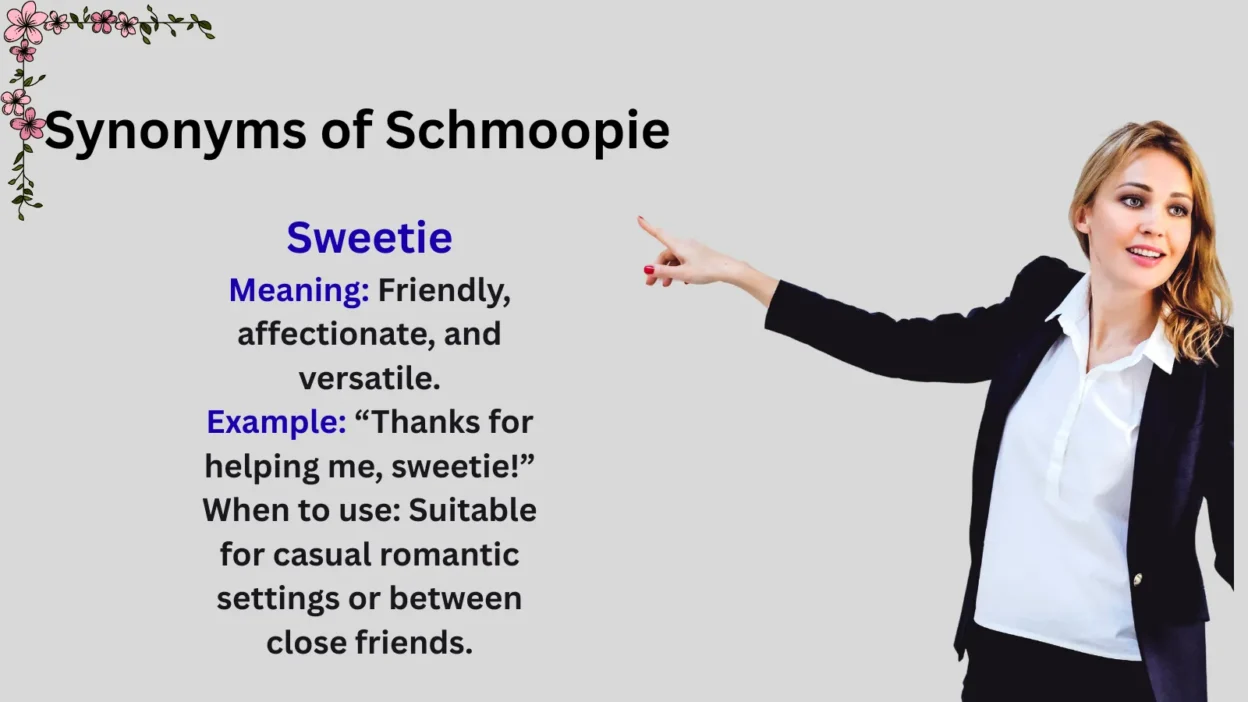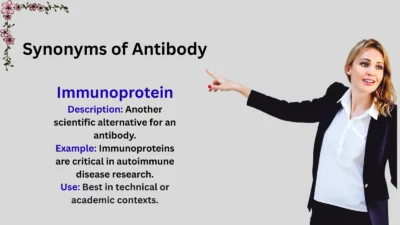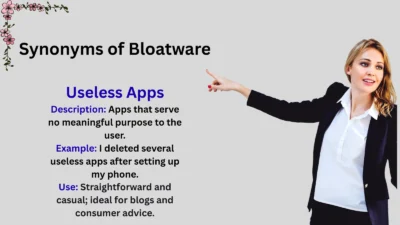Synonyms of schmoopie, such as sweetheart, darling, honey, and lovebug, reflect the soft, affectionate, and playful side of love. For example, “sweetheart” shows genuine affection, while “lovebug” adds a fun and silly touch often used between couples. These words capture different shades of romance—from deep emotional warmth to lighthearted teasing.
If you’re writing about relationships, romance, or cute nicknames, choosing the right synonym helps you match the perfect tone—sweet, serious, or just plain adorable. In this guide, we’ll explore a variety of ways to express love and endearment and when each is most fitting.
These synonyms of Schmoopie not only make your writing more personal but also deepen your understanding of how language captures love and closeness. From heartfelt confessions to playful pet names, the words of affection are as warm and colorful as love itself.
What Does Schmoopie Mean?
Schmoopie is a cute, affectionate nickname used for someone you love. It became popular through pop culture—especially from TV shows and romantic comedies—and is often used playfully between couples.
Depending on how you use it, Schmoopie can evoke:
- Deep affection
- Romantic playfulness
- Emotional warmth
- Loving or silly tone
It’s not just a nickname—it’s a word that shows closeness and care. Think of Schmoopie as the sound of love turned into a smile.
Synonyms & Related Words for Schmoopie (And When to Use Them)
1. Honey
Meaning: A classic term of endearment expressing love and warmth.
Example: “Good morning, honey, did you sleep well?”
When to use: Ideal for long-term partners or in sentimental, everyday contexts.
2. Sweetie
Meaning: Friendly, affectionate, and versatile.
Example: “Thanks for helping me, sweetie!”
When to use: Suitable for casual romantic settings or between close friends.
3. Darling
Meaning: Slightly more formal or traditional term for someone cherished.
Example: “Darling, shall we go for dinner?”
When to use: Works well in written notes, romantic gestures, or polite settings.
4. Love
Meaning: A Simple and universal term for affection.
Example: “See you later, love.”
When to use: Common in British English; short and endearing in casual conversation.
5. Babe
Meaning: Trendy, modern nickname for a romantic partner.
Example: “Hey, babe, how was your day?”
When to use: Best for younger couples or informal texting.
6. Baby
Meaning: Very intimate and affectionate; often conveys romantic love.
Example: “I missed you, baby.”
When to use: Romantic, casual, and emotional contexts.
7. Boo
Meaning: Urban, playful term for a significant other.
Example: “Boo, want to watch a movie tonight?”
When to use: Informal, fun, and sometimes flirtatious settings.
8. Sweetheart
Meaning: Traditional and tender, showing care and affection.
Example: “Don’t worry, sweetheart, everything will be fine.”
When to use: Romantic or comforting situations.
9. Cutie
Meaning: Highlights someone’s charm or attractiveness.
Example: “You’re such a cutie in that sweater!”
When to use: Playful or flirty contexts; works for kids, partners, or friends.
10. Snugglebug
Meaning: Endearing term for someone cuddly.
Example: “Come here, my little snugglebug.”
When to use: Emphasizes warmth and physical closeness.
11. Angel
Meaning: Suggests purity, care, or adoration.
Example: “Thank you for helping me, angel.”
When to use: Romantic or sweet gestures; often conveys admiration.
12. Honeybun
Meaning: Cute and whimsical term of affection.
Example: “Goodnight, honeybun, sleep tight.”
When to use: Casual, cozy, and often used for lighthearted fun.
13. Doll
Meaning: Suggests charm or attractiveness; slightly playful.
Example: “Hey doll, want to grab some coffee?”
When to use: Romantic, nostalgic, or retro-flavored contexts.
14. Lovebug
Meaning: A term expressing affectionate attachment.
Example: “You’re my little lovebug.”
When to use: Ideal for intimate, playful, or endearing moments.
15. Babycakes
Meaning: Playful, affectionate, and sweet.
Example: “Don’t worry, babycakes, I’ve got this.”
When to use: Fun, casual, and loving situations; conveys closeness.
16. Sweetpea
Meaning: Gentle and charming term of endearment.
Example: “Good morning, sweetpea!”
When to use: Romantic, friendly, or parent-child contexts.
17. Snookums
Meaning: Silly, playful, and affectionate nickname.
Example: “Hey, snookums, want some ice cream?”
When to use: Lighthearted, whimsical moments between close people.
18. Pookie
Meaning: Quirky, playful term for a loved one.
Example: “Come here, my pookie.”
When to use: Very casual, intimate, and humorous relationships.
19. Cutiepie
Meaning: Similar to cutie, with an added layer of sweetness.
Example: “You’re my little cutiepie.”
When to use: Romantic, playful, or affectionate notes/messages.
20. Lovey
Meaning: Simple, tender, and informal.
Example: “Thanks for the gift, lovey.”
When to use: Casual, intimate settings; suitable for partners and close friends.
21. Sweetkins
Meaning: Soft, whimsical term of endearment.
Example: “Don’t worry, sweetkins, everything’s fine.”
When to use: Very playful, affectionate, and lighthearted moments.
22. Pumpkin
Meaning: A classic, playful nickname often used for loved ones.
Example: “Good night, pumpkin.”
When to use: Cozy, casual, and affectionate contexts.
23. Snugglepie
Meaning: Emphasizes both affection and physical closeness.
Example: “Come here, snugglepie!”
When to use: Romantic, intimate, and playful settings.
24. Honeybunch
Meaning: Sweet and whimsical; shows care and love.
Example: “You’re amazing, honeybunch.”
When to use: Informal, loving contexts with a touch of nostalgia.
25. Love Muffin
Meaning: Cute, playful, and affectionate.
Example: “You’re my little love muffin.”
When to use: Lighthearted, intimate, and humorous interactions.
26. Darlingheart
Meaning: Romantic, tender, slightly formal.
Example: “I can’t wait to see you, darlingheart.”
When to use: Ideal for letters, notes, or gentle romantic gestures.
27. Sugarplum
Meaning: Charming, whimsical, and affectionate.
Example: “Goodnight, sugarplum, sweet dreams!”
When to use: Romantic, playful, or bedtime contexts.
28. Cuddlebug
Meaning: Someone who loves hugs and closeness.
Example: “Come here, my cuddlebug!”
When to use: Emphasizes physical intimacy and warmth.
29. Snookie
Meaning: Playful, affectionate, and sometimes humorous.
Example: “Hey Snookie, want to go on a walk?”
When to use: Very casual, intimate, and playful settings.
30. Honeykins
Meaning: Cute, whimsical nickname for someone adored.
Example: “Thanks for helping, honeykins!”
When to use: Informal, intimate, and playful contexts.
How to Choose the Right Synonym
Selecting the perfect Schmoopie synonym depends on several factors:
- Tone:
- Romantic: Babe, Baby, Lovebug, Darlingheart
- Playful: Snookums, Pookie, Honeybun
- Sweet/Caring: Sweetpea, Honey, Angel
- Formality:
- More formal or classic: Darling, Sweetheart, Angel
- Informal/fun: Snookie, Babycakes, Cuddlebug
- Cultural Preference:
- Some terms like “Love” or “Sweetie” are more common in the UK.
- Urban slang like “Boo” or “Snookie” resonates more in casual, contemporary settings.
- Relationship Context:
- Romantic partners: Baby, Babe, Honey
- Close friends or family: Sweetpea, Cutie, Honeybunch
- Pets: Cuddlebug, Snugglebug, Pumpkin
- Playfulness vs. Seriousness:
- For playful affection: Snookums, Pookie, Honeykins
- For serious or tender affection: Darling, Sweetheart, Angel
Conclusion
Choosing the right synonyms of Schmoopie depends on how you want to express love, playfulness, or affection. Whether you prefer something classic like sweetheart or fun and modern like boo or cutie pie, each word captures a unique emotional tone. These alternatives help you say “I love you” in your own style—whether it’s romantic, humorous, or just plain adorable.
By exploring different ways to say Schmoopie, you add more warmth and creativity to your relationships and conversations. So go ahead—pick the nickname that fits your heart best and make every “Schmoopie moment” even sweeter.



